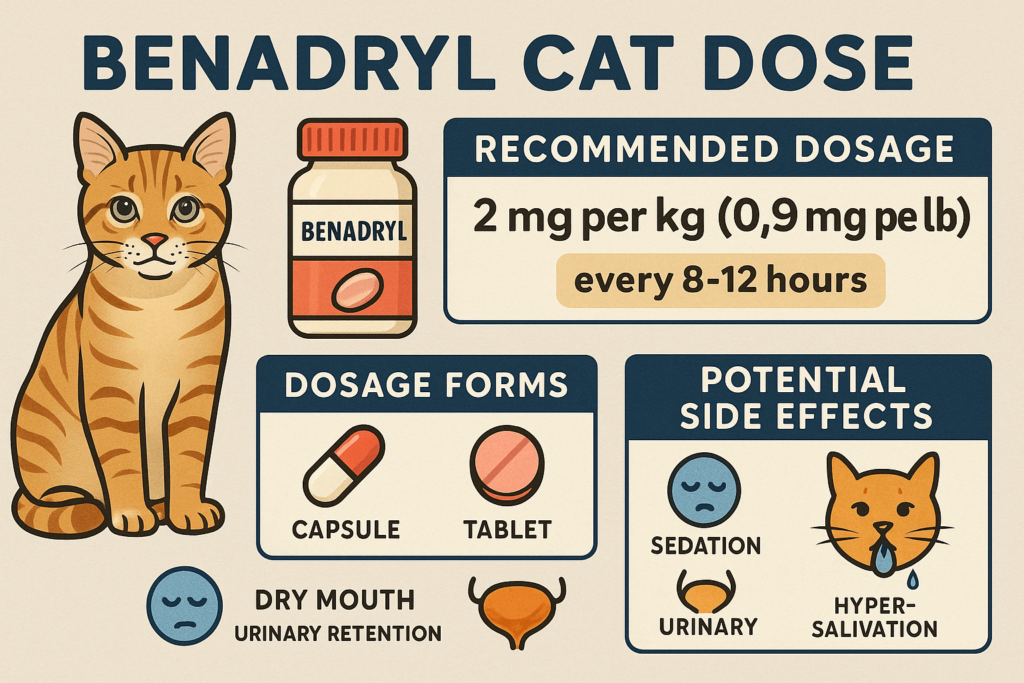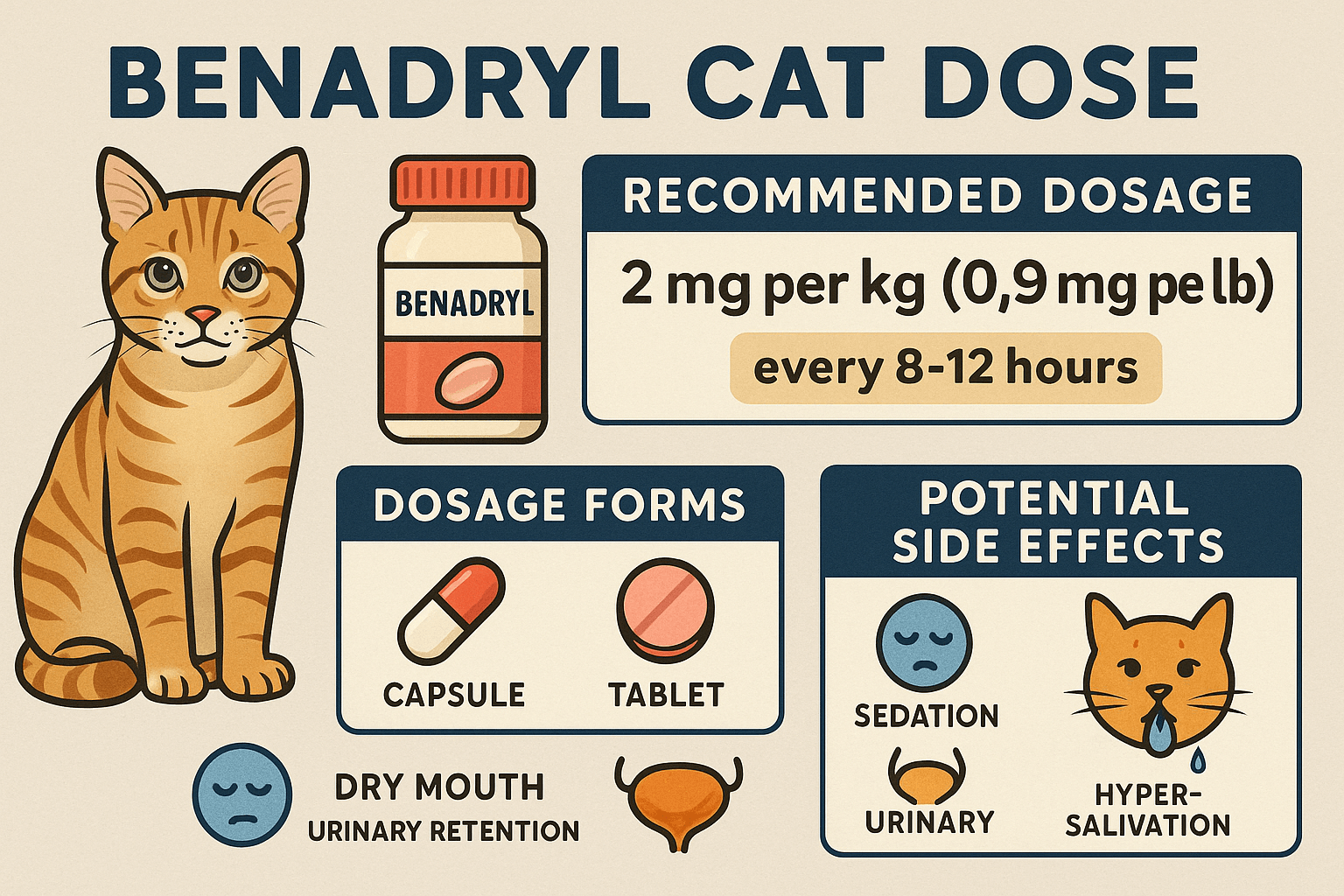Benadryl Cat Dose: What You Need to Know
When it comes to your cat’s health, even over-the-counter medications like Benadryl require careful consideration. While Benadryl (diphenhydramine) is commonly used in humans to treat allergies and motion sickness, its use in cats must be approached with caution. Understanding the correct dosage, potential side effects, and when it’s appropriate to administer this medication can make all the difference in ensuring your feline friend’s safety. Whether you’re dealing with seasonal allergies, insect bites, or travel anxiety, knowing how to properly use Benadryl for your cat is essential. Let’s explore everything you need to know about using Benadryl safely and effectively for your cat.
Expert Opinion on Benadryl
“Benadryl” is the brand name of an over-the-counter, human-use antihistamine drug. The active ingredient in Benadryl is diphenhydramine hydrochloride. Benadryl is used to relieve symptoms of allergies such as hay fever (seasonal allergies), as well as itchy skin caused by insect bites, hives, and other causes of mild allergic reactions.
Key Considerations Before Giving Your Cat Benadryl
Before administering Benadryl to your cat, there are several important factors to consider. These guidelines will help you determine if it’s safe and appropriate for your pet.
Consult Your Veterinarian First:
Always seek professional advice before giving your cat any medication, including Benadryl. A vet can confirm whether it’s suitable for your cat’s condition.Check for Underlying Health Issues:
Cats with certain conditions, such as glaucoma, heart disease, or respiratory issues, may experience complications from Benadryl.Avoid Products with Added Ingredients:
Many Benadryl formulations contain additional ingredients like alcohol or decongestants, which can be harmful to cats. Stick to plain diphenhydramine.Monitor for Allergic Reactions:
Ironically, some cats may be allergic to diphenhydramine itself. Watch for signs of an adverse reaction, such as swelling or difficulty breathing.Never Use Human Dosage Guidelines:
Cats metabolize medications differently than humans, so following human dosing instructions can lead to overdose or toxicity.
By keeping these considerations in mind, you can ensure that Benadryl is administered safely and appropriately for your cat’s needs.

How to Determine the Correct Benadryl Cat Dose
Finding the right dosage is crucial for your cat’s safety. Here’s what you need to know about calculating and administering the correct amount of Benadryl.
General Dosage Guidelines:
The typical dose is 1 mg of diphenhydramine per pound of body weight, given every 8 to 12 hours. For example, a 10-pound cat would require approximately 10 mg.Weigh Your Cat Accurately:
Use a pet scale or consult your vet to determine your cat’s exact weight, as guessing can lead to incorrect dosing.Administer Liquid or Tablet Form:
Liquid Benadryl is often easier to measure and administer, but tablets can be given if crushed and mixed with food.Avoid Overdosing:
Exceeding the recommended dose can cause sedation, seizures, or other serious side effects. Stick to the prescribed amount.Start with a Small Test Dose:
If it’s your cat’s first time taking Benadryl, give a small amount under veterinary supervision to monitor for adverse reactions.
Proper dosing ensures that your cat receives the benefits of Benadryl without risking their health.
Check this guide 👉Benadryl for Cat Allergy: Best 7 Expert Tips!
Check this guide 👉Solensia for Cats: Best 7 Expert Tips!
Check this guide 👉Metronidazole for Cats: Best 7 Expert Tips!
Benefits of Benadryl for Cats | Potential Side Effects to Watch For |
|---|---|
Relieves allergy symptoms | Sedation or lethargy |
Reduces itching from insect bites | Dry mouth or decreased appetite |
Helps with mild motion sickness | Increased heart rate or breathing issues |
Can calm anxiety during travel | Vomiting or diarrhea |
Safe when used as directed by a vet | Rare allergic reactions |
Common Uses of Benadryl for Cats
Benadryl can be helpful in managing a variety of conditions in cats, but it’s important to understand its appropriate applications.
Seasonal Allergies:
Benadryl can alleviate symptoms like sneezing, watery eyes, and skin irritation caused by environmental allergens.Insect Bites or Stings:
It helps reduce swelling and itching associated with bee stings, spider bites, or flea infestations.Mild Anxiety:
Cats prone to stress during car rides or vet visits may benefit from Benadryl’s calming effects.Motion Sickness:
Some cats experience nausea or restlessness during travel, which Benadryl can help mitigate.Skin Irritations:
Itchy or inflamed skin due to contact dermatitis may improve with antihistamine treatment.
While Benadryl can address these issues, it’s not a substitute for proper veterinary care.
Signs Your Cat May Need Benadryl
If your cat is exhibiting certain symptoms, Benadryl might be a helpful solution—but only after consulting your vet.
Excessive Scratching or Licking:
Persistent grooming behaviors could indicate allergies or skin irritation that Benadryl may relieve.Sneezing or Runny Nose:
Seasonal allergies often manifest as respiratory symptoms, which antihistamines can address.Swollen Paws or Face:
Sudden swelling after an insect bite or sting may warrant immediate use of Benadryl under vet guidance.Restlessness During Travel:
Cats showing signs of anxiety, such as panting or vocalizing, may benefit from a mild sedative effect.Red or Inflamed Skin:
Visible irritation suggests an allergic reaction that could be managed with antihistamines.
Recognizing these signs ensures timely intervention while prioritizing your cat’s comfort.
Signs of an Adverse Reaction to Benadryl
Even with careful dosing, some cats may experience adverse reactions to Benadryl. Recognizing these signs early can prevent complications.
Difficulty Breathing:
Labored or rapid breathing indicates a potential allergic reaction requiring immediate attention.Extreme Lethargy:
Unusual sleepiness or inability to wake up could signal an overdose.Vomiting or Diarrhea:
Gastrointestinal upset may occur if the cat’s system cannot tolerate the medication.Seizures or Tremors:
Severe neurological symptoms demand urgent veterinary care.Swelling of the Face or Paws:
This could indicate an allergic reaction to the medication itself.
Acting quickly at the first sign of trouble ensures your cat receives prompt medical attention.
Alternatives to Benadryl for Cats
If Benadryl isn’t suitable for your cat, there are alternative treatments available to address similar issues.
Prescription Antihistamines:
Medications like hydroxyzine or cetirizine may offer better results for chronic allergies.Topical Treatments:
Medicated shampoos or sprays can soothe irritated skin without systemic effects.Dietary Changes:
Switching to hypoallergenic or limited-ingredient diets can reduce food-related allergies.Environmental Modifications:
Using air purifiers or washing bedding frequently minimizes exposure to allergens.Natural Remedies:
Coconut oil or omega-3 supplements may help reduce inflammation and improve skin health.
Exploring these options provides flexibility in managing your cat’s symptoms effectively.
Tips for Administering Medication to Cats
Giving medication to a reluctant cat can be challenging, but these tips can make the process smoother.
Hide Pills in Treats:
Wrap the pill in a soft treat or cheese to encourage your cat to eat it willingly.Use a Pill Dispenser:
A pill dispenser helps place the medication directly at the back of your cat’s throat.Crush and Mix with Food:
Crushing the pill and mixing it with wet food disguises the taste effectively.Reward with Positive Reinforcement:
Offer praise, treats, or playtime after successful administration to create positive associations.Stay Calm and Patient:
Cats sense stress, so remaining composed makes the process less intimidating for them.
With practice and persistence, administering medication can become a manageable part of caring for your cat.
Frequently Asked Questions About Benadryl for Cats
Can I give my cat Benadryl without a vet’s approval?
No, always consult your vet before administering any medication to avoid potential risks.
What happens if I accidentally overdose my cat?
Overdosing can cause severe side effects; contact your vet or an emergency clinic immediately.
How long does Benadryl take to work in cats?
Effects typically begin within 30 minutes to an hour after administration.
Can kittens take Benadryl?
Kittens should only receive Benadryl under strict veterinary supervision due to their smaller size and developing systems.
Are there alternatives to Benadryl for treating allergies?
Yes, your vet may recommend prescription medications or lifestyle changes to manage symptoms more effectively.
Prioritizing Your Cat’s Health When Using Benadryl
While Benadryl can be a useful tool for managing certain conditions in cats, responsible usage is key to ensuring their safety and well-being. By consulting your veterinarian, adhering to proper dosing guidelines, and monitoring for side effects, you can confidently incorporate Benadryl into your cat’s care routine when needed. Remember, no medication should replace regular veterinary check-ups or tailored treatment plans. With knowledge and caution, you can provide your feline companion with the relief they need while maintaining their overall health and happiness.
Canned Pumpkin for Cat Diarrhea: Best 7 Expert Tips! Natural remedy to firm stools, soothe upset bellies, and support gut health safely.
Can a Cat Give You Scabies? Best 7 Expert Tips! Discover the truth about feline mites, human skin risks, and how to protect yourself—without panic.
Cat Flea vs Human Flea: Best 7 Expert Tips! Discover the truth about bites, species, and how to eliminate infestations for good.
Weird Cat Behaviors: Best 7 Expert Tips! Discover why cats do strange things—and how to understand, not punish, their instincts for a happier home.





